GRBusiness
National Assembly raises 2018 budget to N9.12tn


The National Assembly has raised the 2018 budget by over N508bn, bringing it to N9.12tn.
The original estimates presented to the legislature on November 7, 2017 by President Muhammadu Buhari totalled N8.612tn.
The new budget size was contained in the report of the joint Senate and House of Representatives Committee on Appropriation laid before lawmakers in Abuja on Tuesday.
The crude oil benchmark price of the budget was also increased from $45 to $50.5.
The benchmark alteration confirmed a story by The PUNCH on May 1, 2018 that lawmakers had proposed to increase the benchmark because of the steady rise in the global price of crude.
From about $50 per barrel in November 2017 when Buhari laid the budget estimates, lawmakers noted that the crude oil price had jumped to around $80.
At the House of Representatives, the Chairman, Committee on Appropriation, Mr. Mustapha Bala-Dawaki, presented the report to the House session, which was presided over by the Deputy Speaker, Mr. Yussuff Lasun, on Tuesday.
Lasun announced that the budget would be passed today (Wednesday).
He asked members to pick copies of the report as early as 8am and read it, preparatory to the consideration and passage of the budget.
“Get your copies as from 8am so that by afternoon, we will begin to pass the budget. This announcement is very important, because we will adjourn the House on Thursday to go for the APC congresses”, the deputy speaker informed his colleagues.
There are other changes to the original document as contained in the National Assembly report, different from Buhari’s proposals.
In the President’s estimates, the recurrent expenditure was captured as N3.494tn. But in the new report, it was raised to N3.516tn.
Similarly, the development fund for capital expenditure was raised to N2.869tn from the N2.652tn proposed by the President on November 7.
The provision for statutory transfers also rose to N530.421bn from N456bn.
Debt servicing provision rose to N2.203tn from N2.014tn. The new figure includes the N190bn for the “Sinking Fund.”
However, the naira/dollar exchange rate was retained at N305 to $1.
The daily crude oil production was also retained at 2.2 million barrels.
Also, the Senate on Tuesday received the report on the 2018 Appropriation Bill from the Committee on Appropriations and might pass the budget today (Wednesday).
The Chairman of the committee, Senator Danjuma Goje, laid the report before the Senate at the plenary on Tuesday.
The Chairman of the Senate Committee on Media and Public Affairs, Senator Aliyu Sabi-Abdullahi, had on different occasions said the budget would be passed after the report was presented.
‘We’ll pass remaining parts of PIB in July’
Meanwhile, the ad hoc committee of the House on the Petroleum Industry Bill started a public hearing on the three remaining parts of the PIB on Tuesday.
The committee, which, is chaired by the Chief Whip of the House, Mr. Alhassan Ado-Doguwa, presented the three bills.
They are the Petroleum Industry Fiscal Bill, 2018; Petroleum Producing Host and Impacted Communities Bill, 2018; and Petroleum Industry Administration Bill, 2018.
The National Assembly has already passed the Petroleum Industry Governance Bill, 2017, now awaiting the assent of Buhari.
The Speaker of the House, Mr. Yakubu Dogara, who opened Monday’s hearing, disclosed that by July, the three bills would have been passed.
“We are ready to pass these bills before proceeding on our annual recess. The commitment is there to make a break from the delays of the past years,” Dogara assured the session.
On his part, Ado-Doguwa gave reasons why the current 8th Assembly opted to split the PIB into four parts.
He explained that in the past, the PIB suffered setbacks because all the issues were rolled into one bill.
Ado-Doguwa recalled that some of the issues generated controversies and resulted in the entire bill being rejected.
He stated that this time round, the issues were separated in the four bills so that they would be adequately addressed on their merits.
He added, “You are aware that the PIGB has since been passed by this legislature. These remaining three bills are already on course and we are looking forward to passing them as well.
“In this way, we will have separate bills, each addressing a particular oil industry issue in order to avoid the pitfalls of the past.”
The Minister of State for Petroleum Resources, Dr. Ibe Kachikwu; and the Group Managing Director, Nigerian National Petroleum Corporation, Dr. Maikanti Baru, were absent at the hearing on Monday.
Commenting on their absence, Dogara said it showed the seeming lack of interest of the executive arm of government in having the PIB in place.
“I can see that the minister and the NNPC boss are not represented here. That is not a problem. On our part, we have resolved that before we break for our annual recess, we will pass these bills”, the speaker said.
FG has capacity to implement N9.1tn budget – Experts
Finance and economic experts said that the N9.1tn budget size was implementable.
Those who spoke to one of our correspondents in separate telephone interviews were the Registrar, Institute of Finance and Control of Nigeria, Mr. Godwin Eohoi; a former Director-General, Abuja Chamber of Commerce and Industry, Mr. Chijioke Ekechukwu; and a developmental economist Odilim Enwagbara
Eohoi said in view of the fact that oil prices had been on the upward trend in recent times coupled with the aggressive tax revenue drive of the Federal Government, implementing a budget of that size would not be too difficult.
He stated, “It will be possible to finance the budget of N9.1tn because looking at the oil price, it was at $50 to a barrel when the budget was presented, but now it’s selling for above $70 per barrel. So, it is still within acceptable limit for the lawmakers to raise the benchmark to $50 per barrel.
“There are other windows available for the government to generate more revenue considering the aggressive drive to raise tax revenue from six per cent of the GDP to 15 per cent. So, I think the budget is implementable by the government.”
Enwagbara said at N9.1tn, the Federal Government’s budget was still low compared to the country’s GDP size.
He noted that for the budget to make any significant impact, it must be raised to about 10 per cent of the GDP.
He stated, “Nigeria’s budget is for consumption and what they did is to increase the capital portion of the budget. But I believe we should also raise the budget benchmark price from the $50 proposed by the lawmakers to $80 per barrel to enable us to deploy more revenue to fund the budget.
“The budget should be increased further to about 10 per cent of our GDP because we have one of the lowest budgets in the world. When South Africa is budgeting about $200bn, Nigeria has about $28bn budget for the year, this is very low for us as a country.”
Ekechukwu, on his part, stated, “The increase in the budget figures by the National Assembly can be absorbed by the expected revenue from oil and other sectors.
“This revenue expectation does not obliterate the deficit end of the budget, which will still be funded by debts. Much as the debt profile of Nigeria is rising every day, the debt to the GDP ratio is still not above any tolerable benchmark.
“As far as the increase is not arising from indiscriminate and arbitrary increase for selfish gains, the budget will be implementable.”
An economic expert and Chief Executive Officer, Cowry Asset Management Limited, Mr. Johnson Chukwu, said the expected increase in revenue on the back of rising oil prices should either be used to reduce government borrowing or be channelled entirely to capital projects rather than increasing recurrent expenditure, debt servicing and statutory transfers.
He stated, “If the government is projecting an increase in revenue, that increase in revenue should have been used to bring down the amount that it is going to borrow in the fiscal year, and subsequently bring down the debt service costs. That way, the government would have had a more prudent fiscal budget.
“What will be the motivation for increasing the statutory transfers? It simply means that more money is going to the National Assembly, because part of the statutory transfers goes to the National Assembly, the judiciary and some agencies of government that are self-accounting. I think ordinarily, everybody in the National Assembly should be focused on having a more prudent financial position for the Federal Government.”
Source: Punchng.com
Finance
EFCC Chairman Tasks Nigerian Youths Against Crimes And Fraudulent Acts
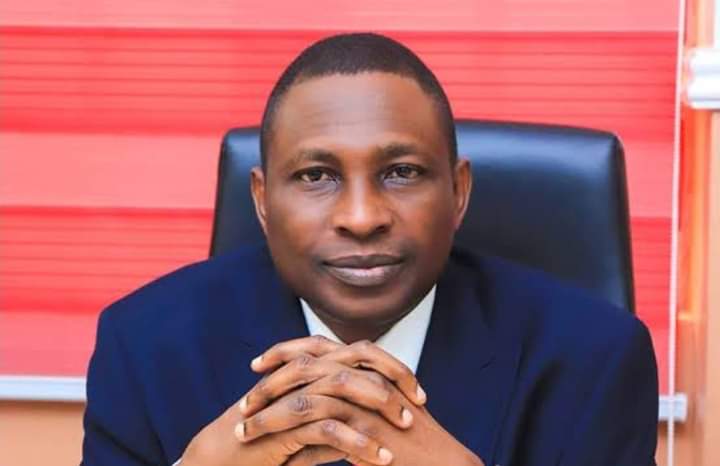

The Chairman of Economic Finance Crime Commission (EFCC), Ola Olukoyede, has stressed the need for Nigerian Youth to see themselves as agents of positive change that have a lot to contribute to the socioeconomic development of the Nation.
Speaking at the 2nd edition of a Leadership Trainings Programme in Abuja, Olukoyede, who was represented by the Head Enlightenment and Re-orientation unit, (EFCC), Aisha Mohammed, said the commission’s dream is to see the youth contribute meaningfully to the society, emphasizing on the need to work together in bringing positive change to society.
The Economic and Financial Crimes Commission Boss declared the readiness of his agency to work with all Stakeholders, including the youth towards changing the narrative and reposition the country to greater exploit.
Also speaking, the representative of the Executive Secretary of Tertiary Education Trust Fund (TETFUND), Sonny Echono, appealed to the youths is to eschew social vices that could deter their full potential in life.
Other speakers at the event, including the Chairperson, Zero Tolerance for Social Immoralities Initiative (ZEITI) Africa, Rasak Jeje called on all stakeholders to join hands in collective pursuit of empowering new generation of leaders to curb the rising tides of social Vice among Nigerian youths.
The Chairperson, Zero Tolerance for Social Immoralities Initiative (ZEITI) Africa, Rasak Jeje made the call while addressing journalists at the 2nd edition of it Leadership Trainings Programme in Abuja on Thursday.
He said the training was aimed to intimate students leaders with knowledge and insights that will help them drive positive change and become exemplary leaders in their respective spheres.
Finance
AISA Has Refunded The Fees Paid By Yahaya Bello To EFCC
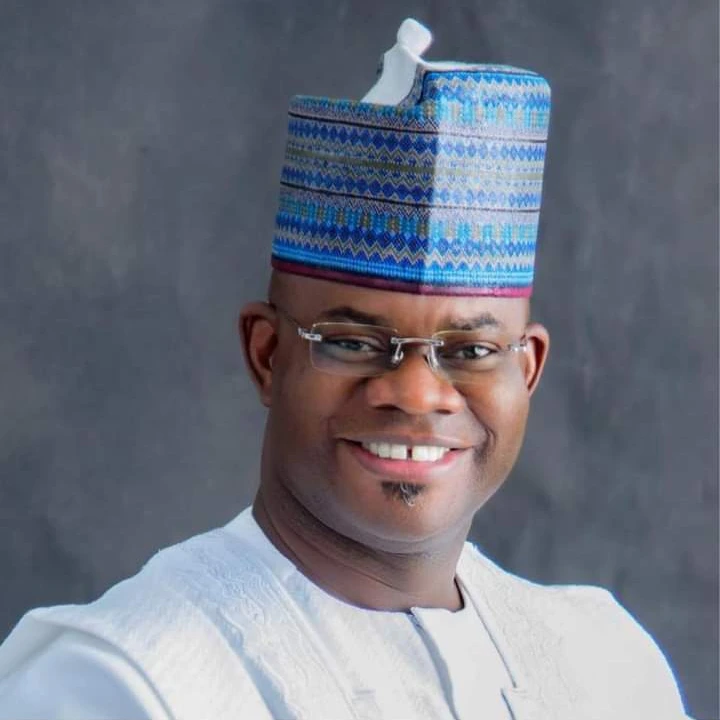

The Economic and Financial Crimes Commission (EFCC) says the American International School Abuja (AISA) has refunded the fees paid by the immediate past governor of Kogi state, Yahaya Bello, for his children attending the school.
In response to a letter addressed to the Lagos zonal commander of the EFCC, the school said $845,852 was paid in tuition “since the 7th of September 2021 to date”.
AISA said the sum to be refunded is $760,910 because it had deducted educational services already rendered.
“Please forward to us an official written request, with the authentic banking details of the EFCC, for the refund of the above-mentioned funds as previously indicated as part of your investigation into the alleged money laundering activities by the Bello family.
Since the 7th September 2021 to date, $845,852.84 (Eight Hundred and Forty-Five Thousand, Eight Hundred and Fifty Two US Dollars and eighty four cents) in tuition and other fees has been deposited into our Bank account.
We have calculated the net amount to be transferred and refunded to the State, after deducting the educational services rendered as $760,910.84. (Seven Hundred and Sixty Thousand, Nine Hundred and Ten US Dollars and Eighty Four cents).
No further additional fees are expected in respect of tuition as the students’ fees have now been settled until they graduate from ASIA.”
In a chat with The Cable, the spokesperson of the EFCC, Dele Oyewale, confirmed that the school has refunded the money.
‘’The money has been paid into public account,” Dele Oyewale was quoted as saying
Finance
Godwin Emefiele Disobeyed Direction Of Law With Intent To Harm The Public, He Printed ₦684.5M Using ₦18.9B Says EFCC in fresh charge


The Economic and Financial Crimes Commission has filed a fresh charge at the High Court of the Federal Capital Territory against the embattled former governor of the Central Bank of Nigeria, Godwin Emefiele.
EFCC in the charge accused Emefiele of approving the printing of N684,590,000 at the rate of N18.96 billion.
EFCC also alleged that Emefiele broke the law with intent to harm the public during his implementation of the naira swap policy of the administration of former President Muhammadu Buhari.
The anti-graft agency also accused Emefiele of unlawfully approving the withdrawal of N124.8 billion from the Consolidated Revenue Fund of the Federation.
EFCC’s top prosecutor, Rotimi Oyedepo, SAN revealed that Emefiele will be arraigned on a new four-count charge before Justice Hamza Muazu
Counts one to four of the charge, read,
“STATEMENT OF OFFENCE: Public Servant disobeying direction of law with intent to cause injury to the public contrary to and punishable under Section 123 of the Penal Code Law, Cap. 89 Laws of the Federation, 1990.
“PARTICULARS OF THE OFFENCE: That you GODWIN IFEANYI EMEFIELE between the 19th day of October 2022 and 5th March 2023 in Abuja, knowingly disobeyed the direction of Section 19 of the CBN Act, 2007, by approving the printing of N375,520,000.00 pieces of colour swapped N1, 000, at the total cost of N11,052, 068,062 without the recommendation of the Board of Central Bank and the strict approval of the President, Federal Republic of Nigeria which conduct of yours caused injury to the public and you thereby committed an offence.”
This and three other charges were stated against him. They read;
“COUNT 2: “That you, GODWIN IFEANYI EMEFIELE, between the 19th of October 2022 and 5th March 2023 in Abuja, knowingly disobeyed the direction of Section 19 of the Central Bank of Nigeria Act, 2007, by approving the printing of 172,000,000 pieces of colour swapped N500 (Five Hundred Naira) Notes, at the total cost of N4, 471,066,040 without the recommendation of the Board of Central Bank and the strict approval of the President, Federal Republic of Nigeria which conduct of yours caused injury to the public and you thereby committed an offence.
“COUNT 3: “That you GODWIN IFEANYI EMEFIELE between the 19th day of October 2022 and 5th March 2023 in Abuja, knowingly disobeyed the direction of Section 19 of the CBN Act, 2007, by approving the printing of 137,070,000 pieces of colour swapped N200 (Two Hundred Naira) Note, at the total cost of N3, 441, 005, 280 without the recommendation of the Board of Central Bank and the strict approval of the President, Federal Republic of Nigeria which conduct of yours caused injury to the public and you thereby committed an offence.”
“COUNT 4: “That you, GODWIN IFEANYI EMEFIELE, on or about the 7th day of October 2020, in Abuja, within the jurisdiction of this Honorable Court, knowingly disobeyed the direction of Section 80 of the Constitution of the Federal Republic of Nigeria, 1999 (As Amended), by approving the withdrawal of the total sum of N124, 860, 227, 865.16 from the Consolidated Revenue Fund of the Federation in a manner not prescribed by the National Assembly, which conduct of yours caused injury to the public and you thereby committed an offence.”
-



 News5 days ago
News5 days agoNigerians Seek Woman Who Spoke Out Eloquently Against Fuel Scarcity In Viral 1994 TV Clip
-



 News4 days ago
News4 days agoAnambra State Government Arrests Man For Marrying Off His Underage Daughter
-

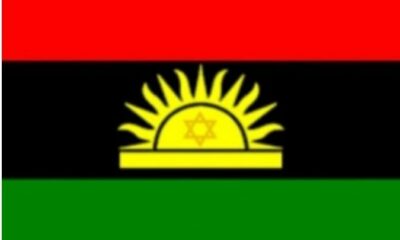

 News3 days ago
News3 days agoIPOB Declares May 30th As Sit-at-home Day Across The Southern East States To Honour Biafran Fallen Heroes
-

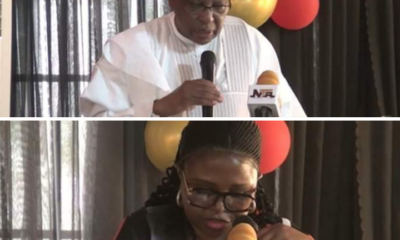

 Education2 days ago
Education2 days agoFederal Government Sets To Commence School-To-Work Scheme
-



 News2 days ago
News2 days agoLady Dies After Friends Pushed Her Into Boiling Pot Of Fresh Pepper In Delta State
-

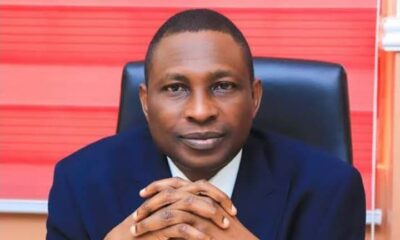

 Finance1 day ago
Finance1 day agoEFCC Chairman Tasks Nigerian Youths Against Crimes And Fraudulent Acts










